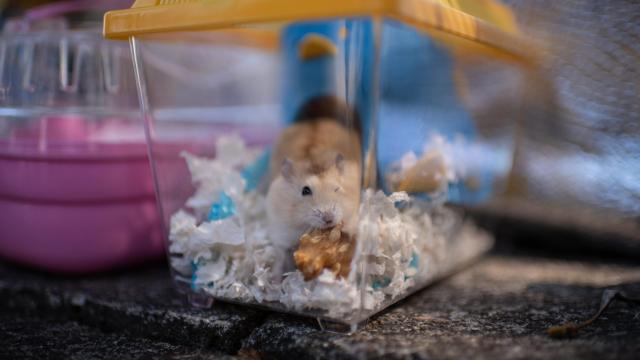You can add pet hamsters to the long list of animals known to carry the coronavirus SARS-CoV-2. Officials in Hong Kong say they’ve confirmed an outbreak involving hamsters and humans that was traced back to a pet shop, though it’s not clear whether these hamsters transmitted the virus to people. With much controversy, Hong Kong is now planning to cull around 2,000 imported pet hamsters and other rodents, and they’re calling for owners who recently bought these pets to submit them for testing and possible euthanasia.
Early this week, officials at Hong Kong’s Agriculture, Fisheries and Conservation department reported that at least 11 hamsters and one employee at the Little Boss pet shop in Causeway Bay had contracted the coronavirus, along with a customer who visited the store on January 7 (the customer’s husband also tested positive recently, the New York Times reported). On Thursday, they reported that two other people who visited pet stores had recently gotten infected, and infected hamsters were found at that location as well. Traces of the virus also appeared to have been found at one of the warehouses where these hamsters were being kept prior to their arrival at the store.
Officials have stressed that it’s not certain whether the hamsters were responsible for the human cases linked to the pet store. But Hong Kong has remained one of the few regions still intent on aggressively limiting the spread of the virus as much as possible. After the discovery of these cases, officials announced the culling of hamsters, guinea pigs, and other rodents across all pet shops that had been imported since December 22, 2021.
“They’re excreting the virus, and the virus can infect other animals, other hamsters and also human beings,” Thomas Sit, assistant director of Hong Kong’s Agriculture, Fisheries and Conservation, told the New York Times. “We don’t want to cull all the animals, but we have to protect public health and animal health. We have no choice — we have to make a firm decision.”
Many animal species can be infected by the coronavirus, including cats, dogs, deer, and minks. And in the lab at least, hamsters have been successfully infected with the virus as well. In many of these documented cases, though, humans have been the ones responsible for the initial outbreak, and the risk of animal-to-human transmission has been considered very rare. That said, some other countries have taken similar culling measures during the pandemic. Notably, Denmark killed off its entire farmed mink population — around 17 million animals — last year following the discovery of rapidly spreading outbreaks on mink farms, along with evidence that minks had transmitted the virus back to human workers.
Denmark’s decision wasn’t universally praised at the time, and neither is Hong Kong’s. Local animal rights groups and citizens have criticised the culling along with the government’s push to have pet owners hand over any rodents imported since late December — the latest sign of tension over the Hong Kong’s zero-covid policies. Some volunteer groups are even actively trying to rescue hamsters marked for death. But for now, the government doesn’t appear to be changing tack. Yesterday, officials with the Agriculture, Fisheries and Conservation Department made clear that they would oppose public efforts to save the hamsters, which could include police intervention.
Editor’s Note: Release dates within this article are based in the U.S., but will be updated with local Australian dates as soon as we know more.
